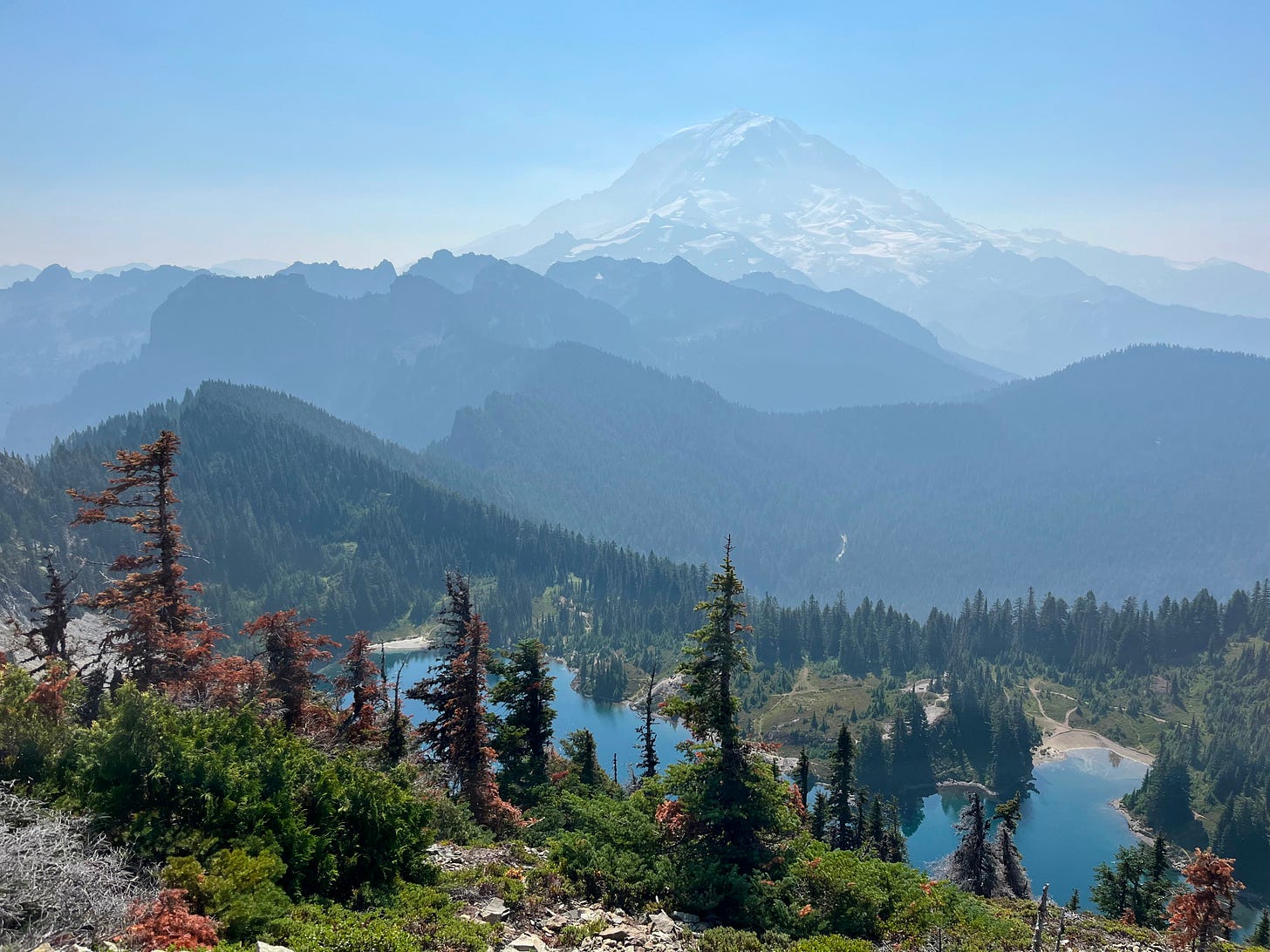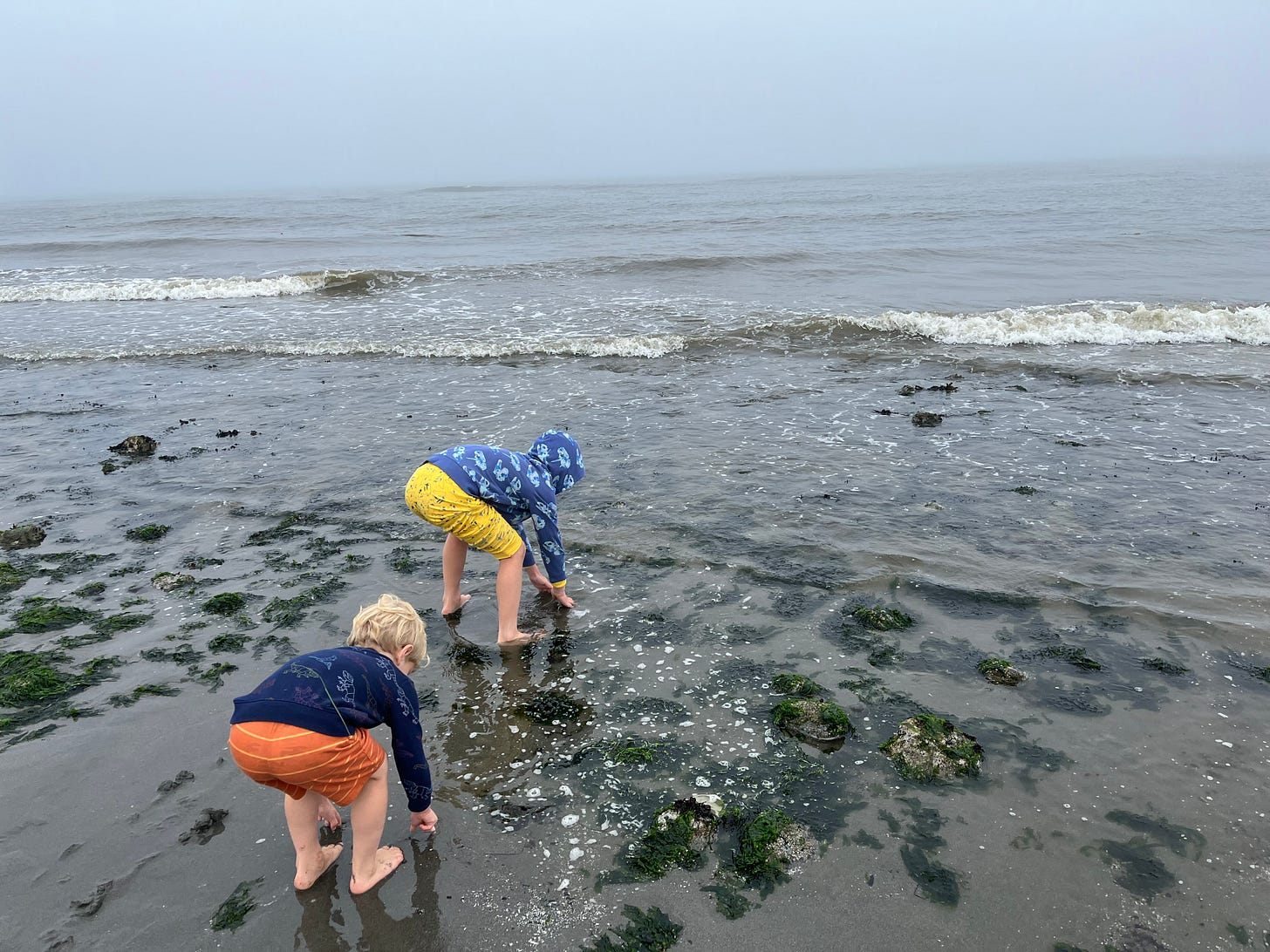Rewilding Yourself to Save the Planet
Part 1 of the Introduction to a book manuscript I'll be working on and publishing excerpts to here.
Introduction, Part 1: Why we Must Rewild our Minds
“The first step in saving nature is the rewilding of our own minds.” - Kris McDivitt Tompkins
This insight stopped me cold and left me wondering if I’d missed the forest for the trees. I work in corporate sustainability with a focus on climate change. My best work is done quietly in my kitchen in Seattle, with a blank sheet of paper, a pencil, and a glass of wine once everyone else in my house is asleep. In these moments, I generate ideas for new products, experiments, ways to organize teams, research topics, and presentations that I make a reality once the sun comes up and I’m back at my desk as a Vice President of Sustainability.
But long before I gained insights over wine, I experienced them through active engagement with the real word. Living in smog-filled Beijing for two years after graduating from college stoked my interest in sustainability. Traveling overland from Beijing to Myanmar and then across China to Hong Kong and finally to the border of China, Russia, Kazakhstan, and Mongolia in Xinjiang Province made me hungry to see more of the world. As a graduate student, I traveled through rural Bangladesh to interview people who were investing in rooftop solar panels in off-grid areas, an experience that convinced me of the private sector’s central role in the fight against climate change.
These memories flashed through my mind as I stared at Kris’ quote. I realized that though my wife and I had moved to Seattle for the access to nature, the wild part of my mind had atrophied to almost nothing over my 15 years in corporate sustainability. Three kids, a dog, and a job will do that to you if you’re not careful. As I learned more about Kris’ story, it dawned on me that awakening my connection to nature and convincing you to do the same will have more impactful on the climate than anything I’ll do as a corporate sustainability professional.
This book is about my quest to rewild my mind and to convince you to do the same, for I believe it’s the most effective tool we have in the fight against climate change.
Humans are the most adaptable species to ever inhabit the Earth. We cover damn near every corner of the planet, eat just about anything, speak thousands of languages, and have mastered the skills needed to make our modern society function, from global laws and trade agreements to computer programing, industrial manufacturing, and large scale agriculture. Life expectancy and material living standards are at historic highs (Ritchie). Man made structures are now estimated to outweigh the mass of the living world (Ménard and Shtarkman). Yet for all of our material progress, this may be a pyrrhic victory. This material wealth comes with the steep price of an altered and increasingly unstable climate, destroyed ecosystems, and a trajectory that’s pushing us far beyond sustainable planetary boundaries (Stockholm Resilience Centre).
While these are global and generational challenges, there is so much within our power to control. Voting for climate-friendly candidates and supporting global environmental treaties helps, but the biggest lever for change are shared ethics and beliefs. Change flows from these headwaters downstream to our laws, regulations, and society. Politics matter, but laws and regulations are a lagging indicator that are susceptible to compromise, poor implementation, political capture, and over-turn.
If you don’t believe me, maybe leading thinkers from a variety of disciplines will do the trick. Douglass North won a Nobel Prize in Economics for highlighting the relative importance of informal constraints, or “norms of behavior, conventions, and self imposed codes and conduct” over the formal constraints of rules and laws in shaping economic performance and outcomes. (North) Similarly, Donella Meadows, a leading systems dynamics thinker, ranked informal norms–in systems parlance, the goals, mindset, and paradigms that shape a system–as the most effective lever for enacting change. Traditional formal constraints like subsidies, taxes, and parameters ranked last. (Meadows)
Aldo Leopold, the father of wildlife ecology and modern conservation, also understood the causal relationship between ethics and action. He lamented our economic and extractive relationship with the land, and believed that substituting this for an ethical relationship between humanity and nature was both “an evolutionary possibility and an ecological necessity.” (Leopold 191)
I think that the time for a new environmental ethic rooted into a deeper connection to the land and wildlife has come. There is a growing body of scientific evidence that increasing the amount of time we spend in nature can improve our mental and physical health, with an especially positive benefit for children. (Weir) The “biophilia hypothesis”, first advanced by the great naturalist E.O. Wilson, posited that evolution endowed humans with a love of nature and that we therefore function better when exposed to it. Spending time in nature can both reduce stress and enhance our ability to focus our attention. (Jiminez et al. 4790).
Unfortunately, as a society we are spending less and less time in natural settings. The number of children who had ever going into the mountains, climbed a tree, fished, or caught an insect declined precipitously from 1998 to 2009, with less than half of those kids having ever climbed a tree. (Soga and Gaston 95). Such an “extinction of experience” kicks off a negative and self-reinforcing feedback loop. As Soga and Gaston write, “the loss of interaction with nature not only diminishes a wide range of benefits relating to health and well-being, but also discourages positive emotions, attitudes, and behavior with regard to the environment, implying a cycle of disaffection toward nature.” (Soga and Gaston 94)
In an increasingly urban and digital-first society, it’s never been easier to go without access to nature. This drift away from the physical and towards a digital-first life intermediated by screens is failing all of us, especially kids. Screens are omnipresent, addicting, and unending. When I walk my dog, pick my kids up at school, or go to the grocery store, I witness people living for and through their screens. Yet this digital simulacrum of a life leaves us depressed, lonely, and aching for connection to each other and, while we may not all recognize it yet, to the natural world as well. AI will only accelerate and exacerbate these problems.
The good news is that our society does not need to be digital-first in the future. The way we live today only scratches the surface of human cultural possibilities. The evidence shows that humans have experimented with a wide variety of living arrangements over the millennia, including non-hierarchical cities with no permanent bureaucracies and cyclical arrangements in which roles and social bonds vary with the seasons. (Graeber and Wengrow). Stepping away from screens and back into the natural world is a far less radical step than those taken by many of our ancestors.
Which brings me back to rewilding. Rewilding aims to repair damaged ecosystems and restore degraded land by removing the barriers that are preventing native species from returning and thriving. This can include habitat restoration, species reintroduction, and ecological management. The goal is to “reestablish vibrant wildlife populations and intact, functional, and resilient ecosystems that effectively integrate people.” (re:wild) Perhaps the most important barrier to remove is the artificial one separating so many of us from the natural world, for humans are also part of the wild.
Not only is rewilding good for humans, it’s a critical climate solution. According to recent research, protecting or restoring the habitats of nine species—marine fish, whales, sharks, grey wolves, wildebeest, sea otters, musk oxen, African forest elephants, and American bison— could capture 6.41 billion tons of carbon/year, or 95% of the carbon needed to meet the Paris agreement goal of limiting warming to 1.5 degrees Celsius. Animal behaviors like eating plants and each other, digging for fun and to make a home, walking around, and pooping can increase the carbon storage capacity of an ecosystem by up to 250%. (Schmitz et al. 324).
In the coming months, I’ll be publishing chapters and draft sections from a book that will tell the story of how we can rewild our minds and planet in a way that can improve our mental health, help restore ecosystem balance, and leave a better world for future generations.
Part 2 of the introduction, which will walk through the planned chapters of the book, is available here.





I love the idea of rewilding! And it being a new way to disrupt our thinking, and ourselves for larger change. Thanks for a great piece and I'm excited to read the book when it's out in the wild!